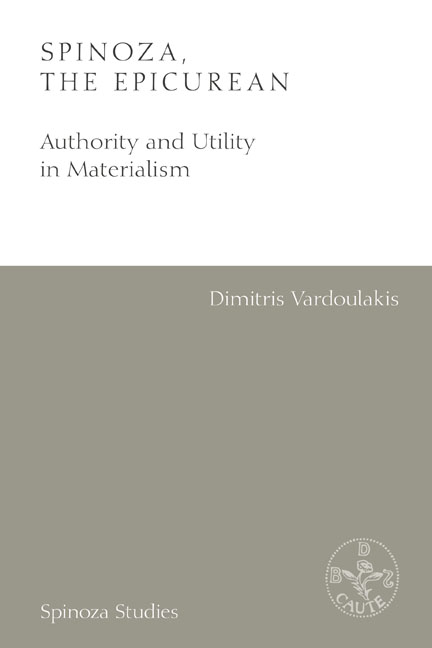Book contents
- Frontmatter
- Contents
- Reference Guide to Spinoza’s Work
- Acknowledgements
- Dedication
- Preamble
- Introduction: Why is Spinoza an Epicurean?
- 1 Freedom as Overcoming the Fear of Death: The Dialectic of Authority and Utility in the Preface
- 2 The Power of Error: Moses, the Prophets and the People (chapters 1, 2 and 3)
- 3 Philonomianism: Law and the Origin of Finitude (chapter 4)
- 4 Political Monism: The Primacy of Utility over Authority (chapters 5 and 6)
- 5 Love your Friend as Yourself: The Neighbour and the Politics of Biblical Hermeneutics (chapters 7 to 13)
- 6 The Freedom to Philosophize: The Two Paths to Virtue (chapters 14 and 15)
- 7 Fear and Power: Natural Right and Authorization in Spinoza and Hobbes (chapter 16)
- 8 Theocracy: On the State of Authority (chapters 17 and 18)
- 9 The Authority to Abrogate: The Two Paths to Virtue and the Internal Enemy (chapters 19 and 20)
- Conclusion: The Limitation of Spinoza’s Epicureanism
- Bibliography
- Index
3 - Philonomianism: Law and the Origin of Finitude (chapter 4)
Published online by Cambridge University Press: 20 October 2020
- Frontmatter
- Contents
- Reference Guide to Spinoza’s Work
- Acknowledgements
- Dedication
- Preamble
- Introduction: Why is Spinoza an Epicurean?
- 1 Freedom as Overcoming the Fear of Death: The Dialectic of Authority and Utility in the Preface
- 2 The Power of Error: Moses, the Prophets and the People (chapters 1, 2 and 3)
- 3 Philonomianism: Law and the Origin of Finitude (chapter 4)
- 4 Political Monism: The Primacy of Utility over Authority (chapters 5 and 6)
- 5 Love your Friend as Yourself: The Neighbour and the Politics of Biblical Hermeneutics (chapters 7 to 13)
- 6 The Freedom to Philosophize: The Two Paths to Virtue (chapters 14 and 15)
- 7 Fear and Power: Natural Right and Authorization in Spinoza and Hobbes (chapter 16)
- 8 Theocracy: On the State of Authority (chapters 17 and 18)
- 9 The Authority to Abrogate: The Two Paths to Virtue and the Internal Enemy (chapters 19 and 20)
- Conclusion: The Limitation of Spinoza’s Epicureanism
- Bibliography
- Index
Summary
The title of chapter 4 announces that it is concerned with ‘divine law’. The opening couple of sentences draw a distinction between divine and human law:
The word law, taken in its absolute sense [legis nomen absolute], means that according to which each individual thing – either all in general or those of the same kind – acts in one and the same fixed and determinate manner, this manner depending either on Nature's necessity or on human will. A law which depends on Nature's necessity is one which necessarily follows from the very nature of the thing, that is, its definition; a law which depends on human will, and which could more properly be termed a statute [jus], is one which men ordain for themselves and for others with a view to making life more secure and more convenient [ad tutius, et commodius vivendum]. (48/57)
It is striking what is elided in this distinction. Specifically, it does not say that the source or origin of divine law is revelation and that of human law is legitimacy or the sovereign as the one who has the authority to legislate. Further, the definition does not define the law in terms of command and obedience.
The reason for these omissions is that these traditional avenues of approaching the law are not open to Spinoza. Revelation, according to chapter 1, is a communication with God that is mediated through the proph-ets’ interpretation, which makes it a human construct. And the command and obedience model cannot account for divine law, since God or nature is understood in strictly impersonal terms by Spinoza. Instead of the traditional routes of approaching legality, Spinoza has recourse to a qualitative distinction between the absolute necessity of divine or natural law, and the dependence of human law on the will of a polity to preserve itself.
The title of chapter 4 announces that it is concerned with ‘divine law’. The opening couple of sentences draw a distinction between divine and human law:
No sooner has Spinoza solved one problem than another arises. The qualitative distinction between necessity and will may be challenged on the grounds that human will cannot be separated in reality from the necessity of nature. What we will and do forms part of the concatenation of causes and effects that constitute the totality of nature.
- Type
- Chapter
- Information
- Spinoza, the EpicureanAuthority and Utility in Materialism, pp. 109 - 140Publisher: Edinburgh University PressPrint publication year: 2020



